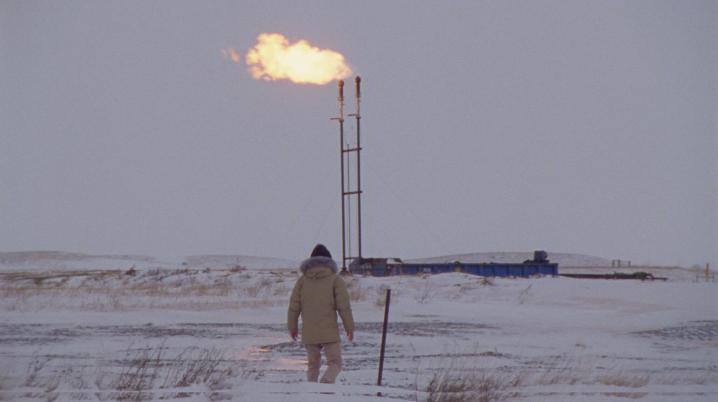
DutchCulture's Green Initiatives: Creating Climate-Friendly Culture
Climate and culture are intricately connected. Cultural norms influence our behaviour towards the planet. DutchCulture takes responsibility to assist in changing those cultural norms, both within our organization and across the sector. We do this by the principles the Council for Culture formulated in its advice Cultuur Natuurlijk (Culture Naturally): less, differently, longer, anew. Therefore, we are committed to assisting the Dutch sector in better understanding its climate impact, providing advice on tools and partners to reduce it, and promoting international collaboration in a different, more sustainable manner. This article outlines initiatives that show our commitment to climate and culture.
Carbon calculator for sustainable AV productions
In cooperation with the sector, the European Commission is developing a useful carbon calculator to calculate the ecological footprint of AV productions. The intended advantages of the tool are the exchange and compatibility of data, ease of use and feedback to policy. The project is running from January 2024 until December 2027 and will result in a calculation methodology for our ecological footprint, as well as a user-friendly web application to be used by AV producers in all 27 member states. The new tool is not intended to replace existing methods and initiatives, but to complement them. DutchCulture | Creative Europe Desk NL will encourage and assist the sector to implement this tool into their work practice.
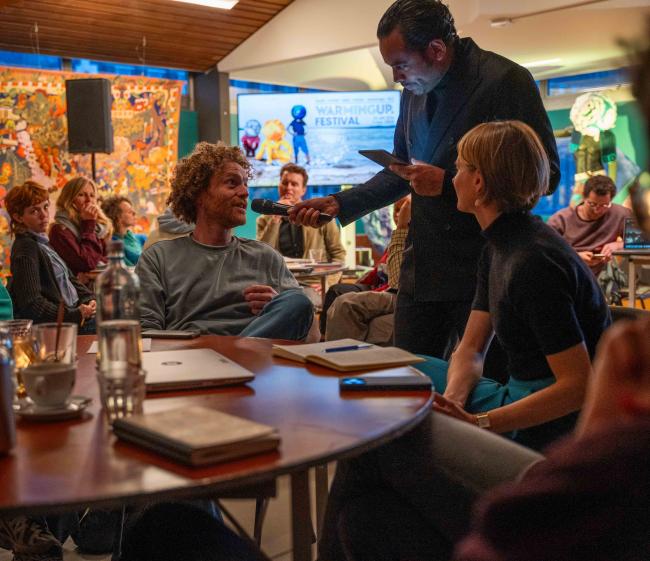
Warming Up Festival
During a brainstorming session on International Cultural Cooperation and the Climate Crisis, organised by DutchCulture at the Warming Up Festival 2023, the participants indicated that for them, sustainable international cultural cooperation is a high priority. An important first step for many organisations is performing a baseline measurement of the climate impact of their travels and projects. Various climate objectives are already being put into practice: distances below 800 kilometres are travelled by train, performances are combined so that multiple venues can be visited in a single trip, and invitations from abroad are weighed against the environmental impact of the required travel.
Call to Action: Culture at the Heart of Climate Action
Artists and cultural voices worldwide urged climate negotiators at the COP United Nations Climate Conference 2023 to prioritize culture in climate action. They are calling for a UN process that would integrate culture into climate policies and frameworks, enabling it to contribute fully to finding solutions. Cultural heritage, traditional knowledge, the arts, and the creative industries can strengthen resilience, inspire action, and shape sustainable lifestyles. This is why DutchCulture supports the global call to the United Nations Framework Convention on Climate Change to include cultural heritage, the arts and creative sectors in climate policy.
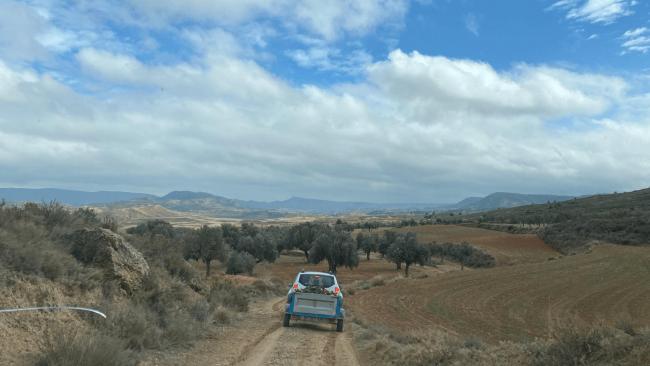
Giving back to the community and residencies in rural Spain
Last September, we organised the live event Country Focus: Spain – Changing Landscapes, New Residency Opportunities. Keynote speaker Rosa Cerarols discussed contemporary Spain's ecological challenges, such as regions grappling with severe weather conditions like floods, droughts, forest fires, and storms. She also touched upon the role artist residencies can play in this. Through DutchCulture | TransArtists’ network of artist residencies, we actively support and promote alternative, green initiatives in Spain's rural areas that exhibit great autonomy and experimentation with critical issues like the environment and politics.
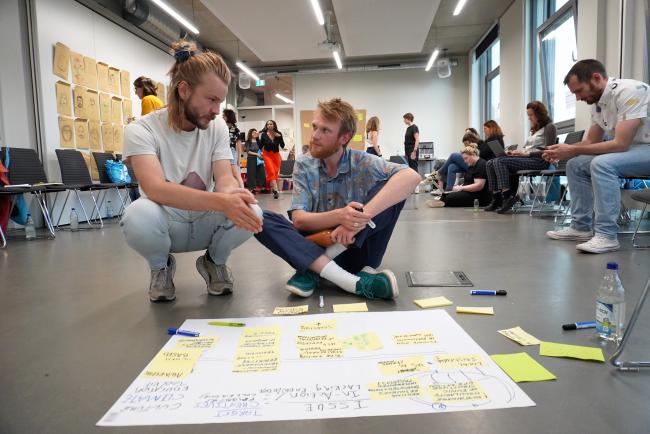
How to mobilize cultural relations for climate action?
The EUNIC Climate Culture(s) Creative Lab, held in Berlin in June 2023, aimed to foster collaboration among EUNIC members on environmental, climate, and culture issues. DutchCulture, in partnership with EUNIC and the Goethe-Institut, created a report highlighting the urgency of climate change and proposing pathways for the network to contribute positively. With a focus on understanding the carbon footprint of international mobility, DutchCulture seeks to support and amplify positive changes initiated by the cultural and creative sectors.
New European Bauhaus: what is it, and what's in it for you?
The New European Bauhaus Festival, held in Brussels in June 2022, aimed to raise awareness of the New European Bauhaus (NEB) and its connection to the European Green Deal. The festival showcased interdisciplinary initiatives, connecting art, culture, education, science, and technology to address climate change and promote sustainable urban planning. DutchCulture | Creative Europe Desk NL attended the festival to inform visitors about the Creative Europe programme and opportunities to participate in NEB. We held panel sessions discussing the role of culture within NEB and showcased NEB projects that received Creative Europe subsidies.
Film screening: 'How to Blow Up a Pipeline'
As partners of the Forum on European Culture (June 2023), we co-organised a film screening of How to Blow Up a Pipeline, a film that has caused passionate debates within the climate change movements on whether the time for negotiating, lobbying, and "raising awareness" about the climate crisis has already passed. During the following Q&A with film director Daniel Goldhaber and Clare Farrell, co-founder of Extinction Rebellion UK, we discussed whether we should actually blow up pipelines, and how best to communicate ideas and ideals to a wider audience.
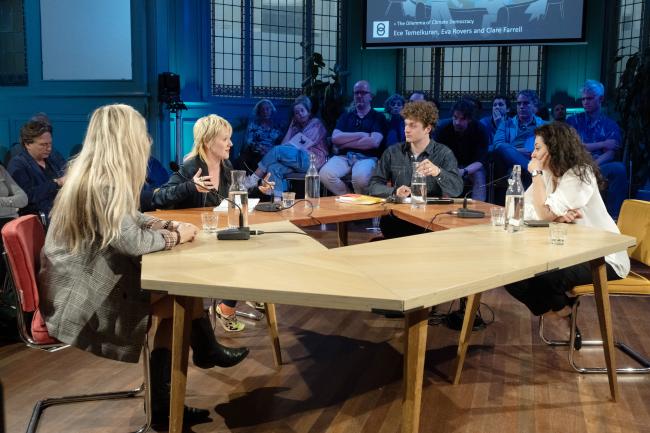
Talk: The Dilemma of Climate Democracy
At the same Forum on European Culture, we teamed up to organise the talk The Dilemma of Climate Democracy, exploring the urgent need for global action to address the existential threat of climate change. The participants discussed whether it is possible to save the planet without breaking the current system. Turkish journalist, author and keynote speaker Ece Temelkuran shared her perspective on the subject. She was joined by Eva Rovers, Dutch author and cultural historian, and again, co-founder of Extinction Rebellion UK Clare Farrell.
Creative Europe Day 2022
Every year DutchCulture | Creative Europe Desk NL organises the Creative Europe Day, where we discuss the current developments within the Creative Europe programme. The 2022 edition focused on sustainability: how can the cultural, creative, and audiovisual sectors participate in the sustainable transition? Among others, Barbara Gessler (Head of Creative Europe Culture at the European Commission) talked about sustainability within the Creative Europe programme and its relationship with the European Green Deal, and Joris Janssen spoke about the essence of sustainable international cooperation. The day aimed to inspire the stakeholders of the Creative Europe programme in the Netherlands and provide the tools to become more sustainable in their working environment.

